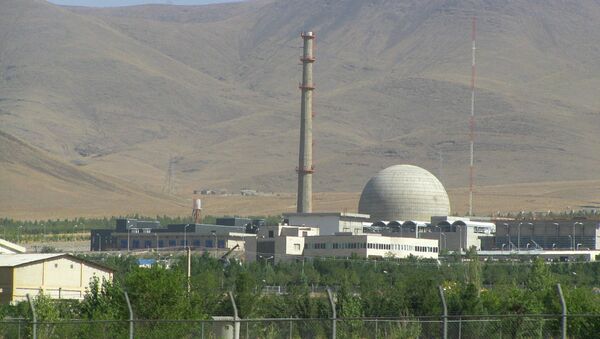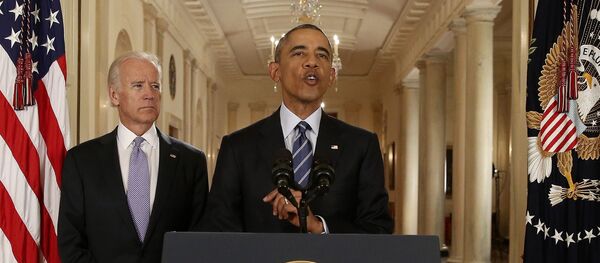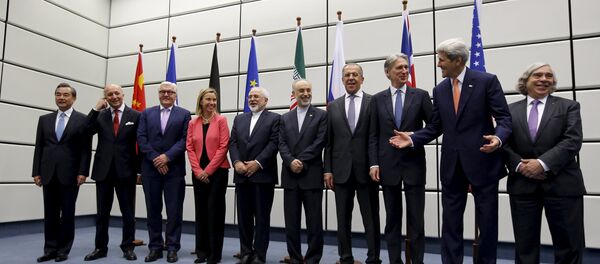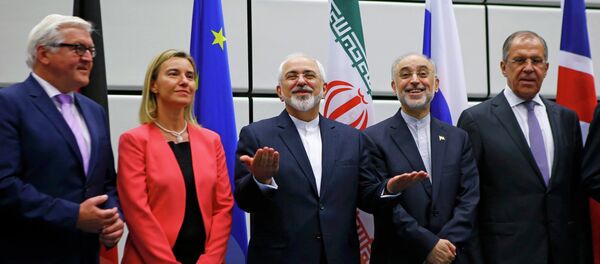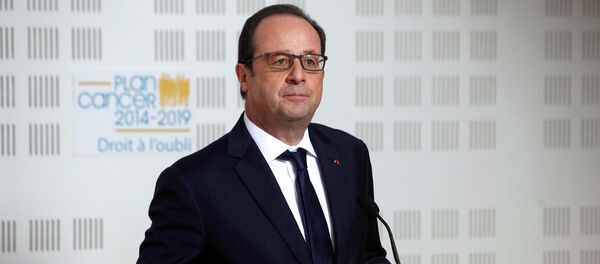"We have agreed Iran's heavy water reactor arak will be rebuild based on a final design of the United States," Kerry said asserting Arak will be used for peaceful purposes only.
Agreement is a step away from specter of conflict, towards possibility of peace. This is the good deal we have sought pic.twitter.com/JY9YSZrPQs
— John Kerry (@JohnKerry) 14 июля 2015
"Iran will not build a new heavy water reactor or reprocess fuels from its existing reactors for at least 15 years."
Kerry also emphasized the assurance that Iran would not covertly produce a nuclear weapon.
P5+1 & #Iran reached agreement, bringing insight & accountability to nuclear program — not for small # of yrs, but lifetime of program.
— John Kerry (@JohnKerry) 14 июля 2015
"The deal that we have reached also gives us the greatest assurance that Iran will not pursue a weapon covertly. Not only will the inspectors be able to access the declared facilities, but they would also have access to the entire supply chain that supports Iran's nuclear program."
Their faces say: "We did it!"/ Их лица говорят: "Мы сделали это!" pic.twitter.com/LBG6B7dtzE
— MFA Russia (@mfa_russia) 14 июля 2015
The easing of sanctions imposed on Iran over its nuclear program will take place only when Tehran complies with its commitments, Kerry said.
"The relief from sanctions will only start when Tehran has met its key initial nuclear commitments," he said adding that the sanctions would be removed when Tehran removed the core of the Arak reactor, or dismantled the centrifuges it had promised to dismantle, or ships out the enriched uranium.
"When these commitments are met, the sanctions relief will then begin to be implemented in phases. The reason for that is very simple — confidence is never built overnight, it has to be developed over time," Kerry said.
The US top diplomat reinforced that sanctions in regard to Tehran’s nuclear program were the only ones to get relief, while the remainder on terrorism, human rights, and ballistic missiles would remain.
"What we are announcing today is an agreement addressing the threat posed by Iran’s nuclear program. Period. Just the nuclear program," Kerry said.
"If Iran violates a deal, all of these sanctions will snap back into place." –President Obama on #IranDeal pic.twitter.com/WqRiJHjtyb
— Vice President Biden (@VP) 14 июля 2015
Kerry also added that Washington would keep a very close eye on Tehran’s activities.
"As such, a number of US sanctions will remain in place including those related to terrorism, Human rights, ballistic missiles. In addition, the United States will continue our efforts to address concerns of Iran's actions in the region, including our providing key support to our partners and our allies and making sure we are vigilant in punching back against destabilizing activities," Kerry said.
"The agreement we have reached, fully implemented, will bring insight and accountability to Iran's nuclear program not for a small number of years, but for the lifetime of their program. This is the good deal that we have sought," Kerry said in Vienna.
He said the agreement would be gradually implemented 90 days after the UN Security Council signs the agreement.
"This agreement will be implemented in phases, beginning within 90 days of the UN Security Council endorsing the deal. And some of the provisions will be in place for 10 years, others for 15 years, others for 25 years. And certain provisions including many of the transparency measures and prohibition on its nuclear work will stay in place permanently."
"The United Nations resolution 1929, which is the resolution which brings us here, says specifically that if Iran comes to negotiating…sanctions will be lifted. We are not doing that in respect to the arms embargo," he said.
He underlined that the lifting of the arms embargo was one of the stumbling blocks in the latest round of talks.
"There were seven participants on those negotiations. Three of them believe it should not be part of this whatsoever and two of them believe there should be the continuation, the result of the negotiations is that it not only continues for the next five-four years, which is a period in which many other things can begin to happen," Kerry said.
Iran and the International Atomic Energy Agency have come to an agreement to resolve concerns of Tehran’s past nuclear activity, Kerry said.
He said the two parties have already agreed to tackle the issue together.
"[The] Iranians the IAEA have already entered into an agreement on the process to address all the IAEA outstanding questions within three months and doing so is the fundamental requirement for sanctions relief," he said.
"We are under no illusions that the hard work is over, no one is standing here today saying that the path ahead is easy or automatic. We moved to a new phase — a phase that is equally critical and may prove to be just as difficult, and that is implementation," Kerry said.
He underlined that all parties to the deal must implement the commitments stipulated in the agreement.
US Secretary of State John Kerry said Tuesday that he doubts the US Congress would reject legislation tied to Iran’s nuclear program.
